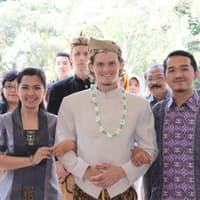Garik Sadovy
Learning more than language
CLS is one of the most intense experiences I’ve ever undergone and it taught me self-discipline in a way I had never before been taught. I came out much more confident in my abilities and in myself. In just two months, my first CLS in Indonesia took my language skills from competent to a point where I could experiment with linguistic subtlety. This was important for me professionally: when I returned to Indonesia the following year to work for the Center for International Forestry Research, I ended up leading a large group in the field, and I could never have managed the group without that sense of linguistic and cultural nuance.
An experiment in interpersonal closeness
This past year, I brought along a self-translated copy of all of questions from an
In a word…
My favorite word is medok. It’s an adjective used to describe a local accent, usually used to tease someone if they have a colloquial way of pronouncing something. (When you say the word, you have to say it in the local accent, which makes it very fun to say.) You might assume it’s mean, but the couple of times that I have used it, everyone laughed uproariously!
If you had one day in Indonesia…
There are some hot springs to the north of Malang that I would really recommend that everyone see and enjoy. They are great in the day, but at night, they’re magical.
Words of wisdom
Indonesia is a place very concerned with the present. I was frustrated for a long time during my first year in Indonesia because I kept comparing things to what I had known from my past. Eventually I learned to surrender my expectations and embrace curiosity in what was around me. This was critical for my success as a part of the CLS program, and one of the most important lessons I’ve ever learned.



